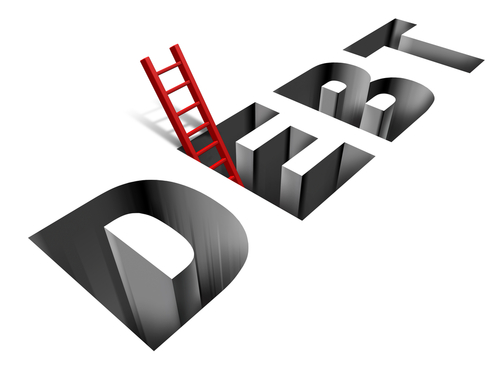Given that so many people across the country are in debt, it is easy to see why some folk think that this is just a natural part of life these days. This isn’t the attitude to have because being in debt can cause you serious problems with respect to achieving what you want to in life. This is why there is a great deal to be said for looking at your debt and taking steps to improve your finances. If you want to get out of your current financial situation, you will find this get out of debt step by step guide to be of benefit.
First Step: List of all your Debts, Balances and the interest Rate
This is an obvious and straightforward move, but it is a move that many people don’t make. How can you get out of debt unless you know what sort of debt you have? You can do this with a pen and paper or you can use a spreadsheet on your computer, the most important thing is obtaining a record of your debt.
You should take all of your latest statement or go to the website of the financial providers that you owe money to and record the name of the provider, the current balance and the interest rates (the APR) for every account.
This will provide you with an overview of your current debt level. This may well be a shocking figure and you may need some time before you move forward but it is a step that you need to take when it comes to improving your finances.
Second Step: Set achievable Goals
Now that you know how much debt you have to clear, this is the amount of money you should be looking to pay off. In a way yes, but in a more important way, no. When you set goals for yourself, setting yourself such a massive aim can be counter-intuitive. When it comes to reaching a goal, if it seems so far away that it is virtually out of reach, you will find that your motivation in reaching this goal is not what it should be. This is why rather than focusing on the ultimate goal, you should look at setting smaller and more achievable goals.
Examples of more achievable goals include:
- Paying off one credit card or loan
- Paying off a certain amount of money every month
- Reducing your expenditure by 20%
- Agreeing a finance plan with a financial advisor and then sticking to that plan for three months
These are all steps along the way to achieving your main but if you don’t take these steps, you won’t be able to achieve the ultimate goal. There is a great deal to be said for the positive feelings and motivational boosts you receive from ticking off goals and meeting aims, so keep yourself on the right track by setting yourself achievable goals.
Third Step: Pay off balances from Highest APR to Lowest APR
It makes sense to have a plan of action when it comes to minimising your debt and this is where noting the APRs of your debts comes into play.
There are a number of schools of thought when it comes to paying off debt but the most sensible action is pay off the debt with the highest level of interest and then work your way downwards. Rather than paying off all of your debts in an equal manner, focus on meeting the minimum payments of all of your debts and then advocating what money you have left to removing the debt with the highest level of APR. This will lower the amount of money you have to spend to service and remove your debts.
Another option is to consolidate your debts into one handy payment and then pay that off. To achieve this, you need to find a loan provider offering a lower rate of interest than what you are currently paying for your debts. One of the best ways to achieve this is through the use of a guarantor loan. With a guarantor loan, the presence of the guarantor provides the loan company with the confidence they need to offer you a loan at a much lower rate of APR. This style of loan is available to people with bad credit, so it is something worth looking into.
Bringing in more income and cutting out unnecessary spending are good steps to improving your finances and reducing your debt but following the above steps will help you move forward with respect to the major aspects of your debt.
Andrew Reilly is a freelance writer with a focus on news stories and consumer interest articles. He has been writing professionally for 9 years but has been writing for as long as he can care to remember. When Andrew isn’t sat behind a laptop or researching a story, he will be found watching a gig or a game of football.



